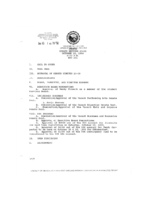Search the Special Collections and Archives Portal
Search Results

Transcript of interview with Anna Sipl Meyers by Leita Kaldi Davis, February 12, 2012, February 29, 2012, March 27, 2012, April 6, 2012, April 24, 2012, May 3, 2012, May 9, 2012, May 16, 2012, October 19, 2012, November 16, 2012, & December 7, 2012
Date
Archival Collection
Description
From concentration to ownership of Las Vegas casinos, Meyers owned the Cashbah and the and Queen of Hearts in downtown Las Vegas. Interview dates: 2/12/2012, 2/29/2012, 3/27/2012, 4/16/2012, 4/24/2012, 5/3/2012, 5/9/2012, 5/16/2012, 10/19/2012, 11/16/2012, 12/7/2012.
Text

Transcript of interview with Betty Bunch by Joyce Marshall, January 9, 1996, February 7, 1996, & February 13, 2002
Date
Archival Collection
Description
Betty [Rosenthal] Bunch began dancing as a child. By the time she was nine years old she decided she would have a dancing career. At 18 years she began to work in stock theatre productions. Within a short time, she had joined the Moro-Landis dancers. She landed her first job in Las Vegas in 1956 at the Sahara Hotel as part of the opening line for Donald O'Connor. Following the Sahara, she worked as a dancer at the Riveria, and then returned to the Moulin Rouge in Hollywood. In 1961 while vacationing in Las Vegas, she landed a job dancing at the Dunes. She continued to dance, sing and do comedy until after the birth of her second child. At that time, she retired from the Las Vegas showroom, but not from show business. Her involvement in both film and stage has remained rich and varied. This interview focuses on the time Betty spent performing on the Las Vegas strip, including her long involvement with the acclaimed afternoon show Bottoms Up. The interview provides information on workin
Text

Transcript of interview with Mary Ellen Campbell by Ronald Robinson, March 6, 1977
Date
Description
On March 6, 1977, Ronald Robinson interviewed Mary Ellen Campbell (born 1886 in Panaca, Nevada) about her life in Nevada. Campbell first talks about her parents’ move to the United States from England and her own life growing up in Panaca. She also talks about living in Pioche and the conditions of living in these two small Nevada towns. Also present during the interview is Mary’s grandson, Allen Campbell, who sometimes asks a few questions as well.
Text

Transcript of interview with Carl Ciliax by Gary Wood, March 8, 1980
Date
Archival Collection
Description
On March 8, 1980, Gary Wood interviewed Carl Ciliax (born 1941 in Las Vegas, Nevada) about his experiences living in Nevada. Ciliax first describes his family history, his early interests in wildlife, and his background and education in artwork. Ciliax then discusses his early experiences in hunting and his eventual interest in conservationism and preservation, including his involvement with organizations that sought the protection of desert bighorn sheep and the protection of wildlife in general. The two talk more about wildlife, the early development of Las Vegas, and the effects of the atomic testing. The interview concludes with Ciliax’s recollection of recreational activities and some of his thoughts on conservationism.
Text

Transcript of interview with Joanne Pattiani Molen by Irene Rostine, January 25, 1997
Date
Archival Collection
Description
Interviewed by Irene Rostine. In July of 1955, Joanne Molen's husband was offered a job at Nellis Air Force Base, so they moved from Alturas, California, to Las Vegas. Joanne had worked for Citizens Utilities in Alturas as a Western Union teletype operator, so she got a job with the Southern Nevada Telephone Company. She was the only woman to hold some of the positions she held. She worked for the telephone company, which became Sprint, for more than forty years, ending up as a main engineer. Joanne also was a volunteer and was active in community organizations including the American Ex-Prisoners of War and the Disabled American Veterans organizations, which lead to her being appointed by Governor Richard Bryan to the state of Nevada's Veterans Advisory Commission where she became the first woman to hold the position of chairman for the Commission. She was also voted Women of the Year four times by the local chapter of the American Business Women's Association for her work with veterans.
Text

Transcript of interview with Sonja Saltman by Barbara Tabach, August 18, 2015
Date
Archival Collection
Description
Included in this oral history are reminiscences of Sonja Saltman's personal non-Jewish heritage in Austria, the importance of her grandmother in her life, and how she recalls becoming part of the Jewish community.
Sonja Saltman is a psychologist and philanthropist in Las Vegas, Nevada. She is executive director and co-founder of the Existential Humanistic Institute, a non-profit organization based in San Francisco, California that offers training in existential-humanistic therapy and theory. In 2003 Sonja and her husband Michael Saltman founded the Saltman Center for Conflict Resolution at the University of Nevada, Las Vegas (UNLV) William S. Boyd School of Law. The Saltman Center is focused on research, teaching, and public service related to "the advanced study of the nature of conflict and how to resolve it." A native of Austria, Sonja Saltman also serves as the Honorary Consul for Austria in Las Vegas. The Saltmans are involved with multiple charitable organizations and initiatives, both locally and abroad. Sonja Saltman has served on the boards of the Anti-Defamation League, Nevada Women's Philanthropy, and the Black Mountain Institute. Projects that the couple has supported include the rebuilding of homes and bridges is Bosnia, and Streetball Hafla, a basketball program to improve relations between Jewish and Arab teenagers in Israel. In 2014 Sonja and Michael Saltman were recognized as Distinguished Nevadans by the Nevada System of Higher Education. Included in this oral history are reminiscences of her personal non-Jewish heritage in Austrian, the importance of her grandmother in her life, and how she recalls becoming part of the Jewish community.
Text

Transcript of roundtable interview with the Holocaust Resource Center: Myra Berkovits, Susan Dubin and Doug Unger, by Barbara Tabach, September 4, 2014
Date
Archival Collection
Description
Interview with Myra Berkovits, Susan Dubin and Doug Unger of the Holocaust Resource Center. In this interview, the group discusses the beginnings of what is now the Sperling Kronberg Mack Holocaust Resource Center. Edythe Katz-Yarchever is discussed as the catalyst for establishing the center and getting others involved with the Governor's Advisory Council on Education Relating to the Holocaust. Berkovits talks about her role as a liason for Holocaust education in the Clark County School District and the student-teacher conferences held each year with funding from Sheldon Adelson. Unger discusses expanding the outreach to the Washoe County School District with assistance from Atlantis Hotel (Reno, Nev.) owner, John Farahi and Judy Mack. They talk about the previous locations of the Holocaust Resource Center on Maryland Parkway, then Renaissance Drive, and the affiliation with the Jewish Federation and the Jewish Family Service Agency. After funding and personnel issues around 2011, the advisory council and the library went through a re-structuring and hired Susan Dubin who organized and catalogued the library collection. The library is now accredited by the Association of Jewish Libraries.
Text

Transcript of interview with Dr. John Shepherd by Lisa Gioia-Acres, November 21, 2008
Date
Archival Collection
Description
Dr. John Richard Shepherd shares the background of his early life in southern Illinois, his father's and grandfather's occupations, and his educational journey through college and medical school. His army experiences in Chicago and Alabama convinced him and his wife to look for a warm dry climate in which to live, and they relocated to Las Vegas in 1968. Dr. Shepherd recalls the businesses and housing surrounding Sunrise Hospital, the difficulties getting his specialty listed in the phone book, and renting his first office space from Nate Adelson. He also describes taking out a loan to install ophthalmology equipment, hiring an office manager with medical accounting experience, and doing cataract surgery in a way that basically hadn't changed for decades. The passing of the Medicare bill back in 1966 caused Dr. Shepherd's practice to build up quickly. He details the many ways eye surgery changed, including the invention of the intraocular lens and the phacoemulsification procedure. He mentions his and Dr. Shearing's contributions to ophthalmology — better designed lenses and surgical techniques - which they taught to other doctors from all over the country. Dr. Shepherd discusses radial keratotomy, which was a precursor to laser and later LASIK surgery, and describes a lens implant technique he learned in Russia from Dr. Fyodorov. He goes on to share anecdotes and stories of his interactions with patients, his travels as a consultant and as a surgical teacher for Project Orbis, and meeting Fidel Castro. He speaks candidly about his successes and his failures as well. Dr. Shepherd retired in 2006 and immediately enrolled in a Master's program and earned a degree in military history. After a long and distinguished career, after receiving many accolades and awards, he and his wife are enjoying life, splitting their time between Sun Valley, Idaho, and Las Vegas.
Text

Julie McDonald interview, March 14, 1981: transcript
Date
Archival Collection
Description
On March 14, 1981, Michael Richardson interviewed Julie McDonald (b. 1945 in Torrance, California) about her childhood and life in Las Vegas, Nevada. McDonald shares her first impressions of Las Vegas, her schooling and the location of residential areas. Throughout the interview, McDonald also goes into detail concerning her occupations at the Guild Theatre, her secretarial work at Nellis Air Force Base, her singing career and being a “21” dealer. McDonald discusses the changes in the gaming industry, particularly the incorporation of women dealers, the use of the silver dollar and the requirements for dealers. McDonald ends by discussing housing, major happenings within Las Vegas, recreation as a kid and mass media in early Las Vegas.
Text

Meeting minutes for Consolidated Student Senate University of Nevada, Las Vegas, October 18, 1990
Date
Archival Collection
Description
Text
